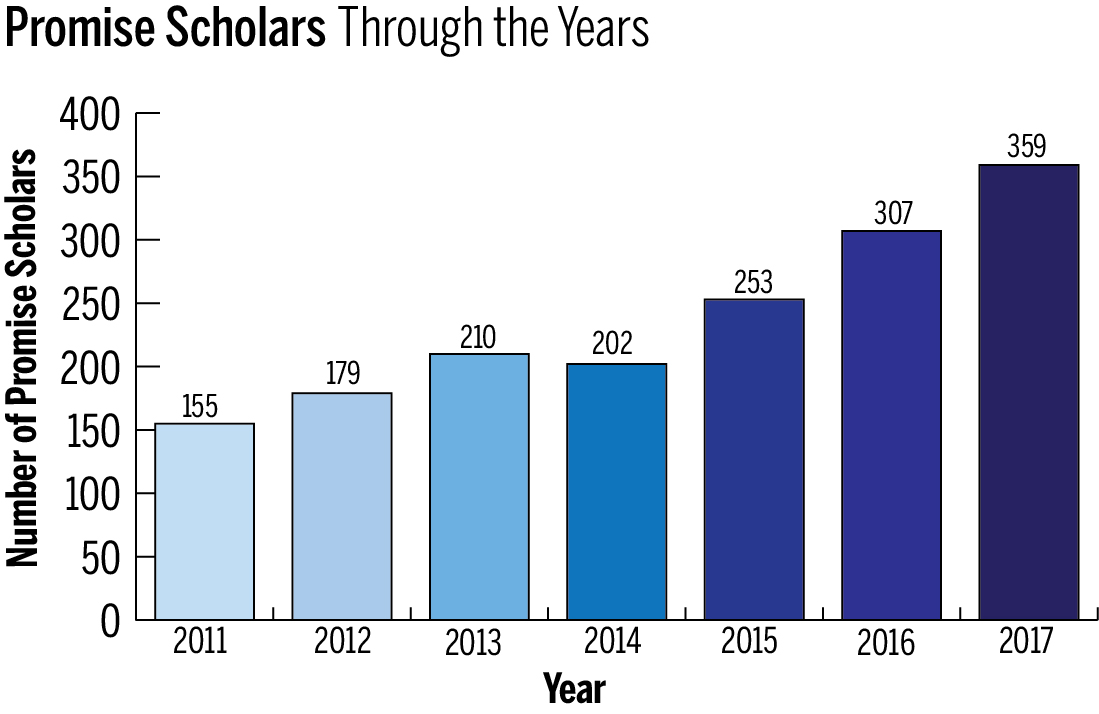
Maggie Nolan
New Haven Promise will support more than 300 New Haven students this year as they begin their first year in college.
Since its inception in 2011, New Haven Promise, an incentive-based scholarship and support program funded by Yale, has disbursed $6.2 million to help more than 1,000 New Haven high school students attend Connecticut universities. The program covers up to full tuition for in-state public colleges and an annual maximum scholarship of $2,500 for students attending independent nonprofit colleges, including Yale. The 2017 Promise scholar cohort had 359 graduates, including nine students who are now first years at Yale.
“About 45 percent of students come from families with households below $30,000,” said Brett Hoover, New Haven Promise director of data and digital systems. “So it’s changed their ability to make a different choice. It’s opened opportunities that they might not have been able to take advantage of because of the cost.”
Javon Adote, a freshman at the University of Connecticut and one of this year’s Promise scholars, heard about the program as a fourth grader. The program was an incentive for students to maintain good academic standing, he said, as it provided them with a concrete chance to further their educations.
The prospect of the scholarship excited his parents because it would mitigate the cost of attending a four-year university, he added. As he finished his last year at New Haven Academy, Adote and his mother hotly anticipated the moment that Promise would officially announce the recipients. When he heard he had received the scholarship, he felt a wave of relief.
New Haven Promise has a close connection with Yale. The Promise scholarships are funded by Yale, and University President Peter Salovey serves on the program’s board of directors alongside Mayor Toni Harp.
Over the years, the program has expanded from a scholarship to a more comprehensive support program, epitomized by its slogan: “To. Through. And Back.” The program gives students the resources and support to gain access to college and equips scholars with counseling and peer mentorship to get students through college. Promise also helps college students find internships over the summer and later careers in New Haven to give back to their home city.
Returning to New Haven is crucial to the program, which emphasizes the idea that donations to Promise scholar graduates, called “Scholar Dollars,” will be reinvested into the city to strengthen New Haven.
There is a lot that Adote wants to do for New Haven. He is considering pursuing a physics degree integrated with a masters in education so he can help other children be confident in their identity.
“I want to be able to have children inside or outside the classroom see someone who mostly represents their demographic in [New Haven Public Schools], African Americans in particular in the education department,” he said.
The application process begins with a student pledge, which creates a contract between Promise and the student that allows the program to share and receive information about the potential applicant. This allows the program to work with the students through high school to ensure they remain on track and meet requirements. For example, Promise helps high school students find community service opportunities if they need to more service hours.
In addition to having attended a New Haven public school, eligible applicants must have completed a 40-hour community service requirement, achieved a minimum 90 percent attendance during grades 9 to 12 and achieved a minimum 3.0 GPA upon graduation.
New Haven Promise also includes an internship program. On Jan. 10, New Haven Promise hosted an internship fair at the Payne Whitney Gymnasium, which was attended by more than 200 Promise scholars and 100 hiring managers. This coming summer, Promise is expecting to place 150 students in paid internships around New Haven.
Yale has led the way in the internship program, Hoover said. This year he expects that half, if not more than half, of the internships will take place on Yale’s campus in different departments.
“If what were doing is getting a return on the investment by having more and more students come back to the city as they are networked through internships, then what we are attracting back to the city are students with lower college debt than most students,” Hoover said. “They are more prepared to jump right into the economy of the city.”
Sammy Westfall | sammy.westfall@yale.edu







